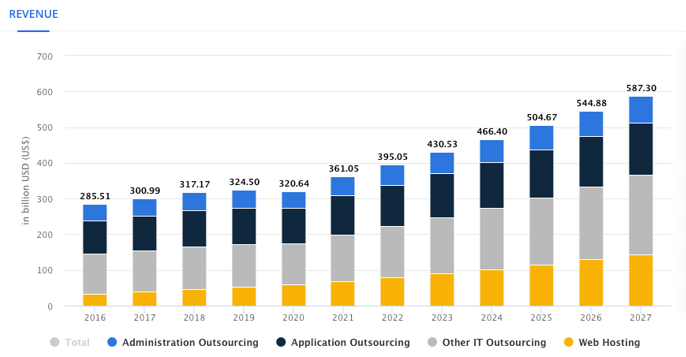Quick Summary:
Choosing the right IT outsourcing partner is crucial for businesses seeking cost-effective and efficient IT solutions. This blog discusses critical factors to consider when selecting an IT partner, such as expertise, service quality, scalability, communication, etc. It also discusses the importance of conducting thorough research and the common mistakes you must avoid while outsourcing.
Introduction
Outsourcing IT services has become a prevalent strategic choice for businesses worldwide. According to Statista, the global IT outsourcing trends show a growth of 8.07% by the end of 2023 and reach $587.30 billion by 2027. This significant growth reflects the increasing recognition of outsourcing's potential to enhance efficiency and reduce costs.

In today's dynamic business landscape, selecting the right IT outsourcing model is more critical than ever. It directly impacts a company's ability to leverage external expertise, access the latest technologies, and remain competitive. By making an informed choice, businesses can unlock opportunities for growth, innovation, and improved productivity.
Therefore in this comprehensive guide, we will delve into the essential factors to consider while IT outsourcing in 2023.
Key Takeaways
- Outsourcing IT services can offer numerous benefits, including cost savings, access to specialized expertise, improved scalability, and enhanced focus on core business functions.
- It is crucial to assess your company's needs, goals, and budget before outsourcing IT services.
- The right IT outsourcing partner should align with your business requirements, possess relevant experience and expertise, ensure strong security measures, demonstrate effective communication channels, and exhibit financial stability.
- Outsourcing IT services can enhance their focus on core competencies and strategic initiatives, improving efficiency and productivity.
When to Outsource Your IT Services?
Outsourcing IT services can bring numerous benefits to businesses, and understanding when it is the right time to outsource can help organizations make informed decisions. Therefore here are some indicators that highlight when programming outsourcing can be advantageous:
1. Lack of In-House Expertise
Technology is evolving at a rapid pace. Due to this, keeping up with the latest developments can be challenging for organizations that lack the necessary skills and expertise.
Therefore, outsourcing IT services provides access to specialized knowledge and experience. This also ensures that your technology needs are handled by professionals well-versed in the latest trends and advancements.
2. Cost Savings
Managing an in-house IT department comes with significant costs. These costs include training IT personnel, investing in IT infrastructure, and providing ongoing support.
This is where outsourcing IT professionals can be convenient. It will eliminate such business expenses by shifting them to the outsourcing partner.

3. Scalability and Flexibility
Business requirements can fluctuate over time. Thus, having the flexibility to scale IT operations accordingly is crucial. Outsourcing IT services allows businesses to adjust their resources to match changing demands easily.
An outsourcing partner can swiftly adapt to meet your needs without significant investments or disruptions. This allows businesses to maintain agility and allocate resources efficiently, ensuring a seamless alignment between IT capabilities and evolving business needs.
Recommended Read: Top 10 IT Outsourcing Companies
4. Focus on Enhanced Core Competencies
IT management and support can be resource-intensive, taking valuable time and attention away from core business functions. Therefore, outsourcing IT services allows organizations to offload these tasks to experts.
Further enabling them to focus on their core competencies and strategic initiatives. This increased focus can also improve efficiency, productivity, and overall business performance.
Recommended Read: How to Get Maximum Productivity from your IT Outsourcing Team?
5. Access to Advanced Technology
Technology plays a central role in keeping businesses competitive. However, acquiring and maintaining the latest technology can be expensive and time-consuming. Outsourcing IT services gives businesses access to advanced technologies, tools, and infrastructure without upfront costs.
Such partners are equipped with the latest resources to deal with various clients. Further, ensuring that your organization can leverage state-of-the-art solutions to drive innovation and efficiency.
6. Increased Speed and Agility
IT projects often have tight timelines. Thus, delays can have significant impacts on business operations. Therefore, outsourcing IT services can expedite project delivery and implementation.
Outsourcing partners have the expertise, experience, and streamlined processes to execute projects efficiently. This helps organizations achieve their goals in a shorter time frame. It also increases speed and agility, providing a competitive advantage in a fast-paced market.
7. 24/7 Support and Maintenance
Round-the-clock IT support and maintenance are crucial to ensure uninterrupted operations. Thus, outsourcing IT services to a partner with dedicated teams can provide 24/7 support can be beneficial.
It can ensure all issues or emergencies are promptly addressed. This constant availability and responsiveness help minimize downtime, enhance user experience, and maintain optimal system performance.
Also, Consider Reading: Outsourcing vs Offshoring: Which is an ideal fit for your requirement?
How to Find the Right IT Outsourcing Partner?
Choosing the right outsourcing partner is a critical decision that can impact the trajectory of your business. To ensure you choose the most suitable partner, follow these seven steps:
1. Define Your Requirements
You must begin by clearly defining your IT outsourcing needs and objectives. Then, determine the specific services you require, the expertise necessary, your budget constraints, and the timeline for the project.
2. Conduct Thorough Research
Conduct thorough research on potential IT outsourcing partners by seeking recommendations from trusted sources. You must explore their online reviews and ratings, and websites. Furthermore, try to gather as much information as possible to create a shortlist of potential partners.
3. Evaluate Expertise and Experience
Now, assess the expertise and experience of each shortlisted partner. Also, look for industry-specific experience, case studies, and client testimonials that demonstrate their capability to handle projects similar to yours. Moreover, remember to pay attention to relevant certifications and qualifications as well.
Recommended Read: All-In-One Guide to Software Development Outsourcing
4. Consider Cultural Fit
Cultural compatibility between your organization and the outsourcing partner is crucial for effective collaboration. Thus, you must evaluate their work culture, values, and communication style. Also, assess their ability to understand your business environment and adapt to your organization's working style.
5. Review Service Quality and Capabilities
You should evaluate the service quality and capabilities of each potential partner. Also, look for evidence of their commitment to delivering high-quality services, such as quality assurance processes, recognized methodologies, and certifications. Furthermore, ensure their capabilities align with your requirements.
6. Ensure Data Security and Compliance
Data security is of utmost priority when outsourcing IT services. Therefore, assess the partner's data security measures, compliance with regulations such as GDPR or HIPAA, and their approach to protecting sensitive information. You must also confirm that they have robust data protection policies in place.
7. Choose a Flexible Partner
You must consider the flexibility of the outsourcing partner. It is important to consider the flexibility of the outsourcing partner as it determines if they can accommodate your changing business needs and growth plans. You should also assess their infrastructure, resource availability, and ability to handle future modifications without compromising service quality.
Recommended Read: In-House vs Outsourcing: Pros, Cons and Use Cases
Key Factors to Consider When Choosing Your IT Outsourcing Partner
If you don’t know how to outsource IT partners. Then, you must be aware of the following factors to ensure successful collaboration with an outsourcing partner:
1. Expertise and Experience
You must seek an IT outsourcing partner with expertise in your industry or technology domain. Consider their experience in delivering similar IT services and projects. An outsourcing company with a proven track record can bring valuable insights and efficiently address your IT needs.
2. Service Quality
You should assess the partner's commitment to delivering high-quality services. Look for established processes, methodologies, and quality assurance measures. A partner emphasizing service excellence will likely meet your expectations and deliver reliable IT solutions.
3. Communication and Collaboration
Effective communication and collaboration are the pillars of a successful outsourcing partnership. Therefore, you must evaluate the partner's communication channels, responsiveness, and willingness to understand your business objectives.

4. Data Security and Compliance
Data security is paramount when outsourcing IT services. Thus, you must assess the partner's data security measures, including encryption protocols and access controls. A reliable partner should prioritize data protection and have robust security measures.
5. Cost-Effectiveness
You must also evaluate the partner's pricing structure and overall value proposition. While cost is an important consideration, it should be balanced with service quality. Look for an outsourcing partner that offers affordable pricing, transparent cost models, and a clear understanding of the value they bring to your business.
Recommended Read: Cost-Benefit Analysis of Outsourcing: India vs USA
Common Mistakes to Avoid When Choosing an IT Outsourcing Partner
While outsourcing IT partner, some of the common mistakes you must avoid are:
1. Skipping Interview Process
Conducting interviews allows you to assess the potential partner's technical expertise, communication skills, and cultural fit. It also provides an opportunity to:
- Ask relevant questions
- Gain insights into their problem-solving abilities
- Evaluate their professionalism
Thus, skipping this step can lead to selecting an IT vendor that may not align with your business requirements or work well with your team.
2. Lack of Proper Due Diligence
Lack of proper due diligence when choosing an IT outsourcing partner can be costly. Investing time and effort in researching potential partners is crucial to ensure a good fit for your business.
To get an idea of their quality of work, you must look for the following:
- Case studies
- Online reviews
- Client testimonials
Taking this proactive approach can save you from the pitfalls of choosing an ill-suited partner and set the foundation for a fruitful and long-lasting outsourcing relationship.
3. Ignoring Service Quality
While cost savings may be appealing, compromising quality can have detrimental effects. Subpar IT services can lead to frequent downtime, system failures, and inefficient support, causing disruptions to your business operations.
It's crucial not to prioritize cost over quality. Instead, prioritize a partner who consistently delivers reliable and high-quality IT services to ensure smooth operations and optimal performance for your business.
Recommended Read: Why IT Outsourcing in India is the Best Decision
4. Not Assessing Scalability and Flexibility
Failing to assess the scalability and flexibility of an IT outsourcing partner can impede your business's future growth. Evaluating whether the partner can accommodate increased demands or technological advancements without sacrificing service quality is crucial.
A lack of scalability may lead to the following:
- Bottlenecks
- Delays/Downtimes
- Missed opportunities
By ensuring that the outsourcing partner has the necessary capacity and adaptability, you can ensure a seamless alignment between your evolving business needs and their ability to meet those needs effectively.
5. Neglecting Communication and Collaboration
Poor communication can lead to delays, misunderstanding, and misalignment with your business goals. It is essential to select a partner who:
- Prioritizes effective communication
- Provides regular updates on project progress
- Maintains open lines of communication
This fosters transparency and allows for timely feedback and adjustments. Ultimately leading to a successful and productive outsourcing relationship.
6. Overlooking Data Security Measures
Neglecting data security leaves sensitive information vulnerable to data breaches and regulatory non-compliance. Therefore, verifying that the outsourcing partner has robust data security protocols to mitigate these risks is essential.
Such data security protocols include:
- Encryption measures
- Strict access controls
- Compliance with relevant data protection regulations
These measures are necessary because prioritizing data security safeguards your valuable data and ensures the integrity of your information assets.
7. Not Considering the Total Cost of Outsourcing
Focusing solely on the initial cost can be a costly mistake. Failing to consider the total cost of outsourcing can lead to unexpected expenses and budget overruns. It is crucial to assess the long-term costs, including:
- Hidden fees
- Additional charges for extra services
- Potential for price escalations
Transparency about your budget and discussing pricing details upfront helps ensure a clear understanding of the financial implications. This further helps in avoiding any unpleasant surprises down the line.
Recommended Read: Which are the Most Popular IT Outsourcing Services?
YTII: Your Right IT Outsourcing Partner
Your Team In India (YTII) has over a decade of experience delivering prompt and precise solutions. It is the ideal choice for outsourcing your needs because of the following IT outsourcing benefits linked with it:
1. Customized Solutions
YTII understands that every business has unique IT requirements. Thus, we work closely with clients to develop tailored solutions that address specific challenges and align with business objectives. This is also one of the main reasons behind our 80% of repeated clients.
2. Advanced Technology and Tools
At YTII, we leverage the latest tools, software, and methodologies to deliver innovative and efficient IT solutions. Therefore, you gain access to state-of-the-art technology without the need for significant investments by partnering with YTII.
3. Proactive Support and Communication
YTII values open communication and proactive support. This is why our team of 200+ certified developers maintains regular and transparent communication channels to keep you informed about project progress, updates, and potential issues.
4. Pocket-Friendly
YTII offers cost-effective IT outsourcing solutions without compromising on quality. We provide transparent pricing models and work within your budget constraints. Thus, you can achieve cost savings compared to maintaining an in-house IT department by partnering with us.
5. Guaranteed Data Security
Our company also realizes the importance of data, especially for businesses. Hence, our team employs strict security protocols.

Frequently Asked Questions
How do I Find the Right Outsourcing Partner?
What are the Four Types of IT outsourcing?
1. Business Process Outsourcing (BPO): Outsourcing non-core business functions such as customer support or payroll processing.
2. Application Outsourcing: Outsourcing the development and maintenance of software applications.
3. Infrastructure Outsourcing: Outsourcing of IT infrastructure management, including servers, networks, and data centers.
4. Knowledge Process Outsourcing (KPO): Outsourcing high-value knowledge-based tasks such as research, data analysis, or consulting services.





![Programming Outsourcing [Guide]: Everything You Need to Know](https://www.yourteaminindia.com/hs-fs/hubfs/In%20depth%20guide%20to%20Programming%20Outsourcing.png?width=352&name=In%20depth%20guide%20to%20Programming%20Outsourcing.png)

